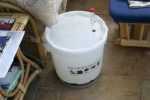So this recipe is shamelessly poached from my brewing guru, Basil. He is a medical herbalist, and knows pretty much everything worth knowing about making your own booze at home. More than once I’ve left his house far too wobbly to ride my bike after far too much (just enough?) elderflower wine, so I’ve decided to try the recipe for myself.
A note on brewing…
Now normally I’m keen on writing up recipes that require no specialist ingredients or equipment. It’s all very well saying that ‘this random ingredient you’ve never heard of and can’t buy ANYWHERE’ is the best thing ever, but well… you can’t buy it anywhere. However, brewing is different and does require some reasonably specialist equipment and ingredients.
You will need:
- A fermentation bin – the best ones have a small hole in the lid for a fermentation lock
- Fermentation lock – basically a little water chamber that lets gas escape, but doesn’t let anything get back in
- A demijohn – a glass or heavy duty plastic jar to ferment it in
- A hydrometer – basically a thermometer without the mercury. It measures the alcoholic potential, and then the actual alcohol produced.
- LOADSA sterilising stuff. Sterilise everything like it’s covered in zombie virus during an outbreak of the undead.
The recipe
- 1/2 pint of elderflowers.
- 3 1/2lb white sugar, a little less if you don’t want it too sweet. This is like a dessert wine.
- Zest and juice of 2 lemons.
- A strong cup of tea (no milk!)
- 1lb sultanas, rinsed under a kettle full of boiling water, chopped
- Yeast nutrients are a good idea, follow the instructions on the box – usually 1 tsp per gallon
- Wine yeast (don’t use your bread yeast… it will die off way too soon!) again usually 1 heaped tsp per gallon
- Water to 1 gallon.
Mix all together in a fermenting bucket and add yeast. This is often referred to as ‘pitching’ the yeast.
Check with your hydrometer the alcohol potential. Bear in mind most yeast will die by 16%, super yeast may live to 18%, so you want a reading of around 1130 – 1140 for the sugar.
Ferment for 5 days then strain into a demijohn. Keep it in the demijohn until there are no more bubbles in the fermentation lock.
Have a taste, and test with the hydrometer for alcohol content, then start bottling!
Make sure that your bottles and siphon tube are fully sterilised and then begin siphoning. I tend to do this with a partner – you don’t want to drag up the sediment at the bottom, so do it slowly and carefully. Once bottled, stopper up or cork your bottles (screwtop is fine if you have them) and don’t forget to label them. It should be fairly drinkable pretty much straight away, though I would recommend keeping it for a few months, or even a year or so.
EDIT: I drank a good proportion of my elderflower wine the following New Year’s eve. The wine was delicious, I drank plenty, had a great time… and had a dreadful hangover to prove it. ‘Nuff said!

